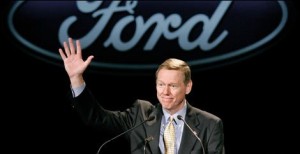 CEO Alan Mulally of Ford Motor Co. said he was planning to stay at the U.S. automaker, which is No. 2 in the country, through this year and would not leave for the top spot at Microsoft.
CEO Alan Mulally of Ford Motor Co. said he was planning to stay at the U.S. automaker, which is No. 2 in the country, through this year and would not leave for the top spot at Microsoft.
Mulally said he wanted to end any speculation about leaving for Microsoft by saying he only wanted to serve Ford. Mulally announced on Tuesday he would stay at Ford through the end of this year.
Mulally’s chance of leading Microsoft has faded of late due to concerns over his age and the lack of experience in technology, said people close to the matter in December. Other candidates vying for the CEO job of the world’s largest software maker have included Satya Nadella, the cloud computing head of Microsoft, Tony Bates, the Executive Vice President and Stephen Elop the former CEO at Nokia.
Mulally and other top executives at Ford had frequently spoken about the 14-month plan that had called for the CEO to stay at Ford through the end of 2014, but did not respond directly to any questions about Microsoft. Ford established Mulally’s successor when Mark Fields was promoted in December of 2012 to COO.
Bill Gates the Chairman at Microsoft has emphasized the importance of finding a CEO that has the ability to lead an organization that is highly technical and has top technical talent.
Longtime CEO Steven Ballmer announced earlier in 2013 that he planned to step down with a year.
Ford shares were down 1.3% at closing on Tuesday to $15.38, while Microsoft shares were up to close at $36.41.
Shares at the automaker were up 19% during 2013, while Microsoft shares jumped 40% for the year.
The candidacy of Mulally for CEO at Microsoft had threatened to overshadow the new vehicle launches at Ford and increased the risk of strife internally amongst his underlings at the company.
